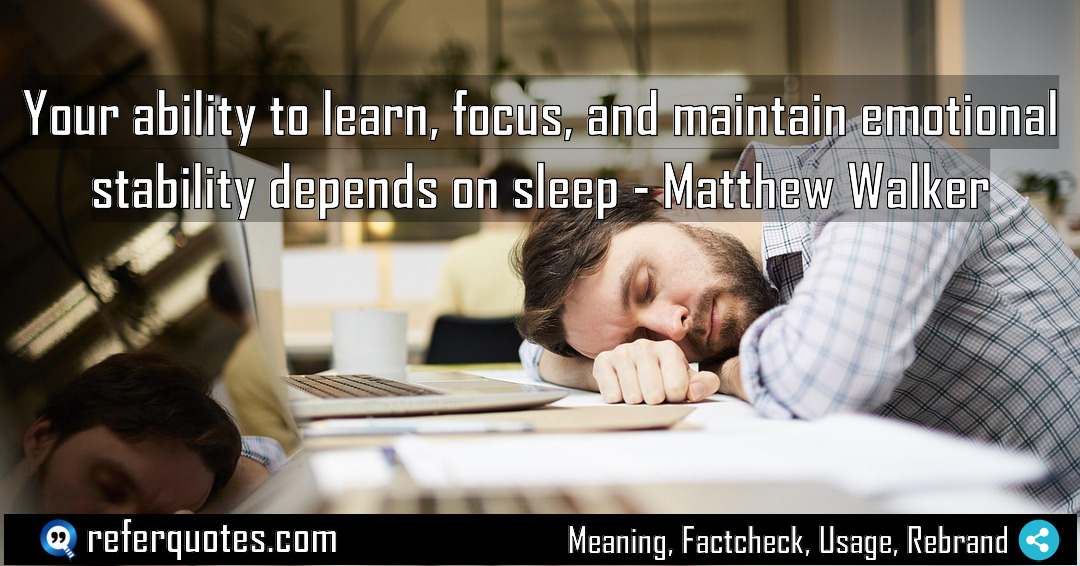Your ability to learn, focus, and maintain emotional stability… it all comes down to one non-negotiable biological necessity. We treat sleep like a luxury, but the science is screaming that it’s the absolute bedrock of high performance and mental well-being. Once you see the data, you can’t unsee it.
Share Image Quote:Table of Contents
Meaning
This quote isn’t a suggestion; it’s a biological fact. Walker is stating that sleep is the fundamental pillar upon which our cognitive and emotional health is built, not an optional extra.
Explanation
Let me break this down based on what we know. Think of your brain like a high-performance computer. Learning isn’t just about input; it’s about consolidation. That happens during deep sleep. Your brain literally replays the day’s events, transferring memories from a temporary holding space (the hippocampus) to the long-term hard drive (the cortex). Without that process, it’s like saving a file to a corrupted disk—the information is fragile, easily lost.
Focus? That’s your prefrontal cortex, the CEO of your brain. It’s the most energy-hungry and sleep-sensitive region. When you’re sleep-deprived, it’s the first thing to go offline. You become distractible, impulsive. You can’t think clearly.
And emotional stability… this one is huge. There’s an amygdala hack that happens with sleep loss. The amygdala, your emotional alarm bell, becomes hyper-reactive. Meanwhile, the prefrontal cortex, which normally acts as the rational brake on that alarm, is weakened. The result? You’re emotionally volatile. Little things feel like massive crises. It’s not a personality flaw; it’s a physiological state.
Quote Summary
| Context | Attributes |
|---|---|
| Original Language | English (3668) |
| Category | Education (260) |
| Topics | focus (155), learning (190), stability (3) |
| Literary Style | direct (414), instructional (42) |
| Emotion / Mood | lively (108), realistic (354) |
| Overall Quote Score | 77 (179) |
Origin & Factcheck
This comes straight from Matthew Walker’s 2017 book, Why We Sleep: Unlocking the Power of Sleep and Dreams, published in the United States. He’s a neuroscientist and sleep researcher, so this isn’t pop psychology—it’s a synthesis of decades of rigorous scientific evidence. You won’t find this quote falsely attributed to anyone else because it’s so core to his life’s work.
Attribution Summary
| Context | Attributes |
|---|---|
| Author | Matthew Walker (60) |
| Source Type | Book (4032) |
| Source/Book Name | Why We Sleep: Unlocking the Power of Sleep and Dreams (60) |
| Origin Timeperiod | 21st Century (1892) |
| Original Language | English (3668) |
| Authenticity | Verified (4032) |
Author Bio
Dr Matthew Walker researches how sleep shapes memory, learning, emotion, and long-term health. After earning his neuroscience degree and a Ph.D. in neurophysiology in the UK, he taught at Harvard Medical School before joining UC Berkeley as a professor and founding the Center for Human Sleep Science. He wrote the global bestseller Why We Sleep and hosts The Matt Walker Podcast. If you’re starting with the Dr Matthew Walker book list, his work blends rigorous science with everyday advice, making sleep research practical for students, professionals, and families.
| Official Website | X
Where is this quotation located?
| Quotation | Your ability to learn, focus, and maintain emotional stability depends on sleep |
| Book Details | Publication Year: 2017; ISBN: 9781501144318; Publisher: Scribner; Number of Pages: 368. |
| Where is it? | Chapter 6: Your Mother and Shakespeare Knew; Page 119, 2017 edition |
